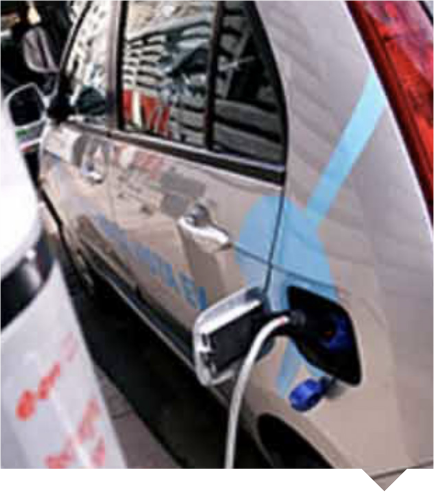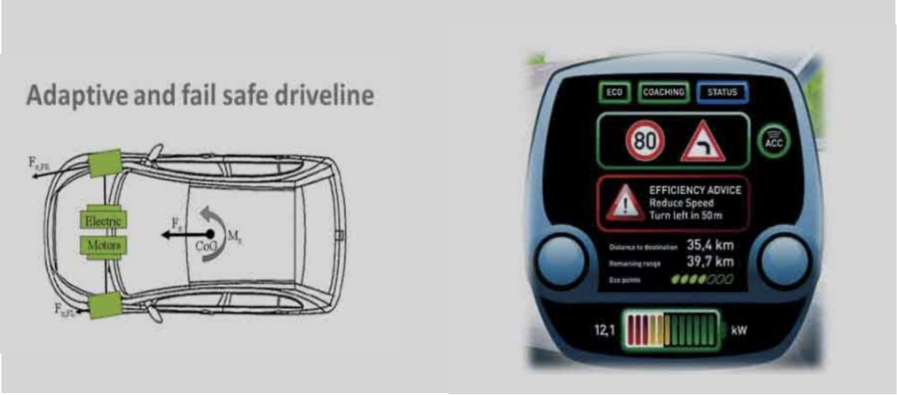
Many Auxiliary Power Unit (APU) concepts have been proposed, including all-new engine types and small conventional engines.
LowCAP is based on an adaptation of an existing Tata gasoline engine using maximum possible carryover of standard production parts and retaining full process compatibility with existing high-volume engine assembly facilities. It is the generator and power electronics alone that have been specially developed.
LowCAP also enables low cost integration, achieved by a common coolant loop shared by the engine, generator and power electronics.
- Tata Motors 2 cylinder 624cc gasoline engine
- Ashwoods low-cost liquid cooled generator
- Integrated liquid cooled inverter
- Integrated engine, generator and power electronics cooling system
- Electrical power output 20kW @ 4,000rpm 23kW @ 5,000rpm
- Minimum Electrical Specific Fuel Consumption (ESFC) 265g/kWh @ 2,500rpm (10kW)
- Mass (dry) 81.5kg (prototype)
- Operating voltage of 350-450V
- Meets Euro 6 emissions levels

- Vehicle development - enabling OEMs to continue development of their low emission vehicles while gaining field and customer experience
- Deploy public charging infrastructure
- Demonstrate practicality of low emission vehicles
- Understand vehicle recharging and driving patterns of users
- Gain user feedback on new vehicle technologies, particularly EVs
CABLED was the first major collaborative project the Design Tech centre entered into. It was closely linked to the Tata Vista electric vehicle (EV) development programme, by taking 25 Vista EVs from the internal programme to feed them into this demonstration project.
CABLED was the West Midlands’ bid to the Technology Strategy Board’s (TSB) competition for ultra-low carbon demonstrator vehicles in early 2009. It was a £5m programme that was 50% funded by the TSB, now renamed Innovate UK, and the Office for Low Emission Vehicles.
A consortium of 12 organisations was formed; Arup was the project manager, with five vehicle manufacturers supporting, two of which were Land Rover and Tata Motors . Birmingham City Council and Coventry City Council supported, with E.ON being the electricity supplier. Aston, Birmingham and Coventry Universities completed the consortium.
Some 110 vehicles from six different manufacturers participated in the project, including full electric, hybrid and hydrogen fuel-cell vehicles.
Over the 12-month trial period the vehicle fleet performed very well with only minor issues. All vehicles were fitted with data loggers so Tata Motors Design Tech Centre also acquired detailed usage and technical performance data. It quickly became apparent that the 'range anxiety' concern was not as real an issue as had been perceived, but one that did require careful journey planning to ensure sufficient charge, or charge time and availability at the destination, to enable the planned round trip.
Over the trial period, Tata Vista EVs had over 300,000 miles on public roads, which resulted in significant knowledge derived on the behaviour and durability of the key EV drivetrain components and systems, with the results being generally a pleasant surprise for such new technologies. This knowledge base is now being used by Tata Motors Design Tech Centre and Tata Motors engineers for future EV and hybrid product development.
The Low Carbon Vehicle Technology Project (LCVTP) was a £29m collaboration programme funded by Advantage West Midlands and the European Regional Development Fund, together with contributions from other project partners, to develop next generation low carbon vehicle technologies in the UK.
The programme was aimed at accelerating the introduction of low carbon vehicles through the development of 15 technical work streams. It aimed to develop a greater understanding to enable technology solutions in key technology areas and accelerate the rate at which a low carbon vehicle may be brought to the market in a cost effective manner.
The Design Tech centre personnel pursued key activities through 12 work streams, as shown below, including leadership of three work streams (WS1, WS4, WS15). Some of the key technologies that produced significant outcomes were:- Research into the performance, testing and integration of lithium ion (Li-ion) battery cells- Battery management system design- Development of drive motor technology for electric vehicle and hybrid electric vehicle applications- Research future power electronics technologies and deliver design tools to aid the design of power modules- Development of scalable low cost, high voltage electrical distribution system- Research into lightweight structures, particularly thermoplastic composite seats Birmingham and Coventry.
| Work stream | Description |
| WS 1 | Batteries and battery packs |
| WS 2 | Drive motors |
| WS 3 | Power electronics |
| WS 4 | High voltage electrical distribution system |
| WS 5 | Auxiliary power units |
| WS 6 | Vehicle supervisory control |
| WS 7 | Lightweight structures |
| WS 8 | Vehicle dynamics |
| WS 9 | High efficiency HVAC |
| WS 12 | Aerodynamic performance |
| WS 13 | HMI |
| WS 14 | Vehicle integration |
The knowledge, products and processes developed from Tata Motors Design Tech Centre participation in the LCVTP programme have enabled the development of concepts for the next generation of electric vehicles (EV) and hybrid electric vehicles (HEV). Tata Motors Design Tech Centre has invested in further research and development in the next generation EVs and HEVs and Tata Motors Design Tech Centre experience from the LCVTP has been utilised in further low carbon vehicle collaboration programmes.
Looking at two work streams in particular, there were multiple achievements throughout the development of the LCVTP programme.
Work stream 1 - batteries and battery packs
- Battery system targets developed to meet vehicle performance and range targets
- Li-ion cell database developed
- BMS concept developed with new energy balancing algorithms
- Battery module and pack concept development
- Cell selection and testing methodologies developed and verified- Understand vehicle recharging and driving patterns of users
Work stream 4 - High voltage electrical distribution system
- Development of generic low cost, safe , scalable lightweight and low cost high voltage electrical distribution guidebook
- Benchmarking of current market trends and technologies
- A study of new technologies to cable and charging interfaces
- Modelling and simulation to optimise HVEDS architecture and positioning of key
- Components
- Concept design of HVEDS for low cost family electric Vehicle
- Whole vehicle communications protocol
- HV safety standards library
The E-Future Project was designed to make the full electric vehicle (FEV) more attractive for future buyers by developing and integrating features that potential customers would find persuasive when considering buying an electric car in the future.
The key technical aspects of the project were based around the development of a new two motor drivetrain to give enhanced control, safety and efficiency. The addition of new driver assistance functionality made the drive and feel of the full EV more acceptable to the potential customer: a ‘virtual range extender’.
The project built two EV demonstration vehicles, which included all of the core components on an existing EV platform but added individual wheel motors for greater control. Intensive validation testing was completed to prove the concept validity for safe and efficient operation. This new vehicle concept had been developed through the project from a clean sheet of paper, creating a new electrical architecture that is scalable, reliable and provides a safe and highly efficient mode of operation. All of these new functions were implemented in a new domain-oriented control unit architecture.

Recognising the prime project deliverable was to deliver customer focussed benefits that would encourage future purchase of EVs, these had to be clearly targeted at current customer concerns that actively discourage purchase. Four groups of benefits were targeted:
- Vehicle integration
- Functional safety concept to account for the adaptive driveline
- Full vehicle chassis modelling and correlation
- Development of novel driveline using two independently controlled direct drive wheel motors
The project was funded by the European Commission and involved collaboration between six companies, each specialists in their own field:
- Tata Motors Design Tech Centre (UK)
- Intedis (Germany)
- Hella (Germany)
- WIVW - Wurzburg Institute for Traffic Sciences (Germany)
- INRETS (France)
- Miljobil Grenland (Norway)
The build of the two EV demonstrators identified means by which customer purchase resistance to EVs can be overcome by the adoption of high tech solutions to many of their concerns. Tata Motors Design Tech Centre involvement in this project, using a fully developed prototype Tata Vista EV as the base car, allowed the construction of an enhanced vehicle that addressed the many customer concerns.
There was successful implementation of a robust functional architecture, creation and implementation of a comprehensive functional safety concept, successful commissioning of the component set selected to support a high safety standard, and the introduction of functions for a reliable and safe operation.
There was also a favourable integration of an energy management system for supporting smart and economical current draw, extension of conventional ACC to a smart and green ACC, and the integration of the driver into the vehicle's decision loop for assisting efficient driving.
The E-Future project has complemented Tata Motors Design Tech Centre EV technology development and knowledge base from the Vista EV and the LCVTP programmes. Tata Motors Design Tech Centre is the centre of excellence for EV and HEV technologies for light duty vehicles for Tata Motors.